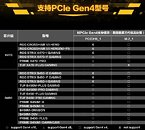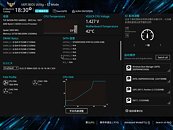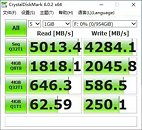- Joined
- Oct 9, 2007
- Messages
- 47,609 (7.45/day)
- Location
- Dublin, Ireland
| System Name | RBMK-1000 |
|---|---|
| Processor | AMD Ryzen 7 5700G |
| Motherboard | Gigabyte B550 AORUS Elite V2 |
| Cooling | DeepCool Gammax L240 V2 |
| Memory | 2x 16GB DDR4-3200 |
| Video Card(s) | Galax RTX 4070 Ti EX |
| Storage | Samsung 990 1TB |
| Display(s) | BenQ 1440p 60 Hz 27-inch |
| Case | Corsair Carbide 100R |
| Audio Device(s) | ASUS SupremeFX S1220A |
| Power Supply | Cooler Master MWE Gold 650W |
| Mouse | ASUS ROG Strix Impact |
| Keyboard | Gamdias Hermes E2 |
| Software | Windows 11 Pro |
ASUS believes that PCI-Express gen 4.0 support on older socket AM4 motherboards based on the AMD 400-series chipset is technically possible, even if discouraged by AMD. The company's latest series of motherboard BIOS updates that expose PCIe Gen 4 toggle in the PCIe settings, does in fact enable PCIe gen 4.0 to all devices that are directly wired to the SoC. These would be the PCI-Express x16 slots meant for graphics, and one of the M.2 slots that has PCIe x4 wiring to the SoC. Below is a list of motherboards scored by Chinese tech publication MyDrivers, which details the extent of PCIe gen 4.0 support across a number of ASUS motherboards based on the X470 and B450 chipsets.
AMD apparently did not explicitly block PCIe gen 4.0 for older chipsets. It merely suggested to motherboard manufacturers not to enable it, since the newer AMD 500-series motherboards are built to new PCB specifications that ensure PCIe gen 4.0 signal-integrity and stability. ASUS wants to leave it to users to decide if they want gen 4.0. If their machines are unstable, they can choose to limit PCIe version to gen 3.0 in their BIOS settings. Among other things, AMD's specifications for 500-series chipset motherboards prescribe PCBs with more than 4 layers, for optimal PCIe and memory wiring. Many of the motherboards on ASUS' list, such as the TUF B450 Pro Gaming, use simple 4-layer PCBs.




To test that PCIe gen 4.0 is actually enabled, MyDrivers used a PCIe gen 4.0 SSD on the M.2 slot that's directly wired to the SoC, on a TUF B450M Pro Gaming. Crystal DiskMark sequential read speeds of the drive are consistent with the same drive tested on an X570 motherboard - with just over 5 GB/s reads. These speeds are impossible on gen 3.0 x4. In a separate article, MyDrivers reports that AMD isn't too happy with ASUS marketing PCIe gen 4.0 support on its 400-series motherboards, and is reportedly trying to block it in updates to the AGESA microcode. Our recommendation - if your updated ASUS 400-series motherboard is running PCIe gen 4.0, don't update its BIOS.
View at TechPowerUp Main Site
AMD apparently did not explicitly block PCIe gen 4.0 for older chipsets. It merely suggested to motherboard manufacturers not to enable it, since the newer AMD 500-series motherboards are built to new PCB specifications that ensure PCIe gen 4.0 signal-integrity and stability. ASUS wants to leave it to users to decide if they want gen 4.0. If their machines are unstable, they can choose to limit PCIe version to gen 3.0 in their BIOS settings. Among other things, AMD's specifications for 500-series chipset motherboards prescribe PCBs with more than 4 layers, for optimal PCIe and memory wiring. Many of the motherboards on ASUS' list, such as the TUF B450 Pro Gaming, use simple 4-layer PCBs.




To test that PCIe gen 4.0 is actually enabled, MyDrivers used a PCIe gen 4.0 SSD on the M.2 slot that's directly wired to the SoC, on a TUF B450M Pro Gaming. Crystal DiskMark sequential read speeds of the drive are consistent with the same drive tested on an X570 motherboard - with just over 5 GB/s reads. These speeds are impossible on gen 3.0 x4. In a separate article, MyDrivers reports that AMD isn't too happy with ASUS marketing PCIe gen 4.0 support on its 400-series motherboards, and is reportedly trying to block it in updates to the AGESA microcode. Our recommendation - if your updated ASUS 400-series motherboard is running PCIe gen 4.0, don't update its BIOS.
View at TechPowerUp Main Site










